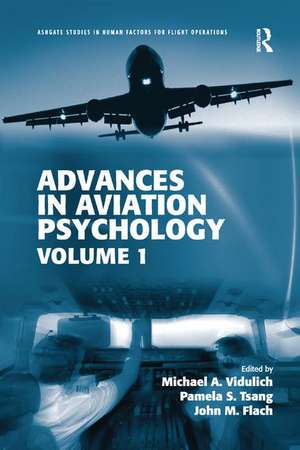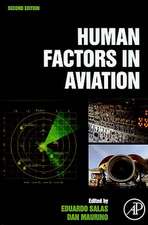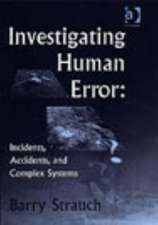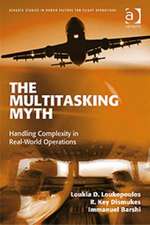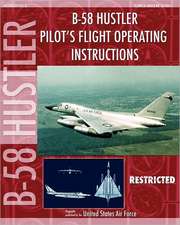Advances in Aviation Psychology: Volume 1: Ashgate Studies in Human Factors for Flight Operations
Editat de Michael A. Vidulich, Pamela S. Tsang, John Flachen Limba Engleză Paperback – 27 oct 2017
| Toate formatele și edițiile | Preț | Express |
|---|---|---|
| Paperback (1) | 337.84 lei 6-8 săpt. | |
| CRC Press – 27 oct 2017 | 337.84 lei 6-8 săpt. | |
| Hardback (1) | 629.46 lei 6-8 săpt. | |
| CRC Press – 19 dec 2014 | 629.46 lei 6-8 săpt. |
Preț: 337.84 lei
Preț vechi: 386.54 lei
-13% Nou
Puncte Express: 507
Preț estimativ în valută:
64.65€ • 67.72$ • 53.58£
64.65€ • 67.72$ • 53.58£
Carte tipărită la comandă
Livrare economică 08-22 aprilie
Preluare comenzi: 021 569.72.76
Specificații
ISBN-13: 9781138574120
ISBN-10: 1138574120
Pagini: 302
Dimensiuni: 156 x 234 x 26 mm
Greutate: 0.43 kg
Ediția:1
Editura: CRC Press
Colecția Routledge
Seria Ashgate Studies in Human Factors for Flight Operations
ISBN-10: 1138574120
Pagini: 302
Dimensiuni: 156 x 234 x 26 mm
Greutate: 0.43 kg
Ediția:1
Editura: CRC Press
Colecția Routledge
Seria Ashgate Studies in Human Factors for Flight Operations
Public țintă
Professional Practice & Development and Professional ReferenceNotă biografică
Michael A. Vidulich is a Senior Scientist at the Air Force Research Laboratory’s Human Effectiveness Directorate’s Applied Neuroscience Branch. He served as the Technical Advisor for the Warfighter Interface Division from 2006 to 2013. He is also a member of the adjunct faculty of the Wright State University Department of Psychology, where he has taught since 1989. Previously, he was a research psychologist at NASA Ames Research Center. He received a B.A. (Psychology) from State University College of New York at Potsdam, a M.A. (Psychology) from The Ohio State University, and a Ph.D. (Engineering Psychology) from the University of Illinois at Urbana-Champaign. His research specializes in cognitive metrics for human-machine interface, evaluation, and adaptation. He co-edited the volume, Principles and Practice of Aviation Psychology with Pamela Tsang. Pamela S. Tsang is professor of psychology at Wright State University in Dayton, Ohio. Previously, she was a National Research Council post doctoral fellow at NASA-Ames Research Center. She received her A. B. (Psychology) from Mount Holyoke College and her Ph.D. (Engineering Psychology) from the University of Illinois at Urbana-Champaign. Her research interests are attention and performance, extralaboratory-developed expertise, cognitive aging, and aviation psychology. She is interested in applications of her research in a wide variety of domains that include aviation, surface transportation, and medicine. She co-edited the volume, Principles and Practice of Aviation Psychology with Michael Vidulich. John M. Flach received his Ph.D. (Human Experimental Psychology) from The Ohio State University in 1984. John was an assistant professor at the University of Illinois from 1984 to 1990 where he held joint appointments in the Department of Mechanical & Industrial Engineering, the Psychology Department, and the Institute of Aviation. In 1990 he joined the Psychology Department at Wright State University. He served as
Recenzii
"This collection of selected symposium papers provides a representative cross-section of the field of aviation psychology and gives readers a good sense of current issues, research progress, and continuing challenges. The keynote addresses provide insightful overviews of several critical topics, and the individual papers illustrate the various research approaches being taken, the power and limitations of those approaches, and the current state of knowledge for a wide range of topics."
- Key Dismukes
"The editors have created an exceptional selection of chapters ranging from state-of-the-art syntheses to data-driven empirical studies. The raw materials were provided by the 2013 Ohio Symposium on Aviation Psychology. Many conference proceedings lack coherence and consistency but this collection exceeds expectations. Beginning with a fascinating historical overview by the editors the papers cover a number of topical issues including NextGen, ecological interface design and selection and training. Leveson's chapter on system safety is a particular standout. Many of the authors are key figures in their areas and their chapters provide essential reading for anyone with an interest in aviation psychology and human factors. There is a notable geographical diversity of contributions with half-a-dozen chapters authored by European experts. This is far more than an ad hoc collection of conference presentations but is a well-thought out and carefully crafted guide to the latest developments in aviation psychology."
- David O'Hare, University of Otago, New Zealand
- Key Dismukes
"The editors have created an exceptional selection of chapters ranging from state-of-the-art syntheses to data-driven empirical studies. The raw materials were provided by the 2013 Ohio Symposium on Aviation Psychology. Many conference proceedings lack coherence and consistency but this collection exceeds expectations. Beginning with a fascinating historical overview by the editors the papers cover a number of topical issues including NextGen, ecological interface design and selection and training. Leveson's chapter on system safety is a particular standout. Many of the authors are key figures in their areas and their chapters provide essential reading for anyone with an interest in aviation psychology and human factors. There is a notable geographical diversity of contributions with half-a-dozen chapters authored by European experts. This is far more than an ad hoc collection of conference presentations but is a well-thought out and carefully crafted guide to the latest developments in aviation psychology."
- David O'Hare, University of Otago, New Zealand
Cuprins
Part I: Aviation Psychology; Chapter 1: Aviation Psychology: Optimizing Human and System Performance; Chapter 2: Applying Systems Thinking to Aviation Psychology; Chapter 3: An Earthbound Perspective on Orientation Illusions Experienced in Aerospace Flight; Part II: Next Generation Air Space and Air Traffic Control; Chapter 4: NASA NextGen Flight Deck Research: A Database of Research Areas and Results; Chapter 5: Flight Deck Models of Workload and Multitasking: An Overview of Validation; Chapter 6: Clarifying Cognitive Complexity and Controller Strategies in Disturbed Inbound Peak Air Traffic Control Operations; Chapter 7: Ecological Flight Deck Design—The World Behind the Glass; Chapter 8: Risk Perception in Ecological Information Systems; Part III: Pilot Factors for Air and Ground-based Operations; Chapter 9: Implications of Text Chat for Air Crew Communication and Coordination; Chapter 10: Human-centered Automation as Effective Work Design; Chapter 11: Enhancing Military Helicopter Pilot Assistant Systems Through Resource Adaptive Dialogue Management; Chapter 12: Individual Pilot Factors Predict Runway Incursion Outcomes; Part IV: Training and Selection; Chapter 13: Synthetic Task Environments and the Three-Body Problem 1; Chapter 14: Enhancing Management of Complex and Unforeseen Situations Among Pilots: New Trends in Cognitive-Adaptation Training; Chapter 15: Distribution of Attention as a Function of Time: A Different Approach to Measure a Specific Aspect of Situation Awareness
Descriere
This book is the first in a series of volumes to be published in conjunction with the biennial International Symposium on Aviation Psychology (ISAP). The aim of each volume is not only to report the latest findings in aviation psychology but also to suggest new directions for advancing the field. More than simply a collection of selected proceeding papers authors expand on their work following the benefit of interactions at the symposium.
